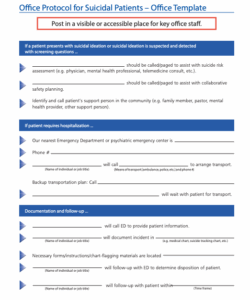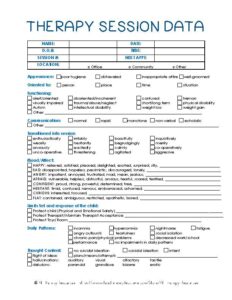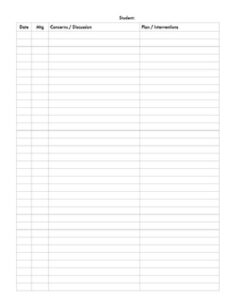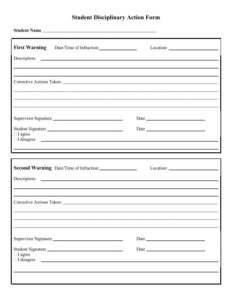Being a school counselor is a demanding job. You’re juggling individual student needs, group sessions, parent meetings, administrative tasks, and crisis interventions, all while striving to create a supportive and positive learning environment. In the midst of all this, one crucial aspect often gets pushed to the side: documentation. But good documentation isn’t just about ticking boxes; it’s about providing effective and ethical care, protecting yourself legally, and ensuring the continuity of services for your students.
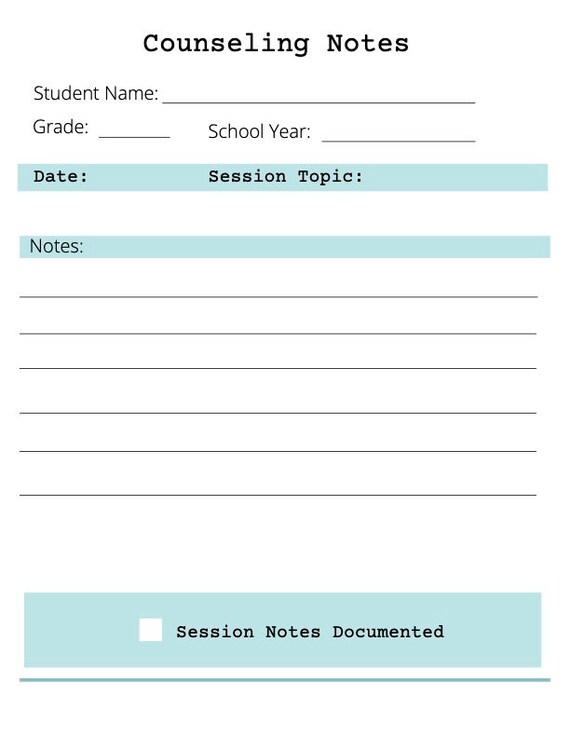
Imagine trying to recall the specifics of a conversation you had with a student weeks ago, or needing to justify your actions in a sensitive situation without a clear record of events. That’s where a well-structured school counselor documentation template comes in handy. It provides a framework for capturing essential information accurately and consistently, making your life easier and your work more effective. It’s a tool that helps you stay organized, compliant, and focused on what matters most: supporting your students’ well-being.
This article explores the importance of documentation for school counselors and provides insights into using a school counselor documentation template. We’ll delve into why accurate records are crucial for ethical practice, legal protection, and continuity of care. You will also learn about the key components of an effective template and how to adapt it to your specific needs. Ultimately, we aim to empower you with the knowledge and tools you need to streamline your documentation process and enhance your ability to serve your students effectively.
Why Accurate Documentation is Essential for School Counselors
Accurate and thorough documentation is more than just paperwork for school counselors; it’s the backbone of ethical practice and effective student support. It serves multiple purposes, ranging from protecting you legally to ensuring consistent care for your students. Think of it as creating a comprehensive narrative of your interactions and interventions, allowing you to track progress, identify patterns, and make informed decisions.
Firstly, documentation plays a crucial role in legal and ethical protection. By maintaining clear and detailed records, you can demonstrate that you’ve acted responsibly and professionally in your interactions with students. This is especially important in situations where your actions may be questioned or challenged. Proper documentation can provide a clear timeline of events, justification for your interventions, and evidence of informed consent where applicable. It’s a way to safeguard yourself against potential complaints or legal issues.
Secondly, good documentation facilitates continuity of care. Students’ needs often evolve over time, and consistent records allow other counselors or professionals to seamlessly pick up where you left off if you’re absent or a student transitions to a new school or program. This is particularly important for students with complex needs or those receiving ongoing support. Without proper documentation, valuable information could be lost, potentially disrupting the student’s progress.
Furthermore, documentation aids in tracking student progress and identifying trends. By carefully recording your interactions with students, you can monitor their development over time and identify patterns or recurring issues. This can help you tailor your interventions to their specific needs and assess the effectiveness of your counseling strategies. It also allows you to identify students who may require additional support or referral to specialized services.
Finally, documentation can be a valuable tool for collaboration with other professionals, such as teachers, parents, and administrators. Sharing relevant information from your records, with appropriate consent, can help create a more coordinated and supportive network for the student. This collaboration can lead to a more holistic understanding of the student’s needs and more effective interventions. A well-maintained school counselor documentation template facilitates easy access and organization, ensuring that vital information is readily available when needed.
Key Components of a School Counselor Documentation Template
A well-designed school counselor documentation template should be comprehensive yet user-friendly, allowing you to capture essential information quickly and efficiently. While the specific components may vary depending on your school’s policies and your individual needs, there are several key elements that should be included. These components help ensure that your documentation is thorough, accurate, and useful for future reference.
First and foremost, every entry should include basic identifying information, such as the student’s name, date of birth, grade level, and contact information. This ensures that the record is accurately linked to the correct student and that you can easily retrieve it when needed. You should also include the date and time of the session or interaction, as well as the type of interaction (e.g., individual counseling, group session, parent meeting).
Next, the template should include a section for documenting the presenting problem or reason for the encounter. This should be a brief but clear description of the student’s concerns, as expressed by the student, parent, or teacher. It’s important to use objective language and avoid making subjective judgments or assumptions. If possible, include specific examples or details that support the presenting problem.
The core of the template should be dedicated to documenting the details of the session or interaction. This should include a summary of the topics discussed, the interventions used, and the student’s response. Be specific about the strategies you employed and the student’s level of engagement. Document any relevant observations about the student’s behavior, affect, or demeanor. It’s crucial to use clear and concise language and avoid jargon or abbreviations that may not be understood by others.
Another important component is a section for documenting any relevant background information, such as previous counseling history, academic performance, family dynamics, or medical conditions. This information can provide valuable context for understanding the student’s current challenges and developing appropriate interventions. However, it’s essential to maintain confidentiality and only include information that is directly relevant to the student’s current needs.
Finally, the template should include a section for documenting the plan for future action. This should outline any specific steps you plan to take to address the student’s concerns, such as scheduling follow-up sessions, making referrals to other services, or collaborating with teachers or parents. It should also include a timeline for these actions and any specific goals you hope to achieve. This section helps ensure that there is a clear plan in place and that the student receives the ongoing support they need. Remember that consistently using your school counselor documentation template will lead to better organization and more efficient use of your time.
The benefits of creating and utilizing a comprehensive school counselor documentation template are far reaching. Not only does it provide an outline for you to record necessary information, it provides a framework for ensuring students receive the services and support they need.
With a thoughtful approach to documentation, you are investing in the well-being of your students and the integrity of your professional practice. It’s an investment that pays dividends in the form of better outcomes for your students, greater peace of mind for you, and a more supportive learning environment for everyone.
